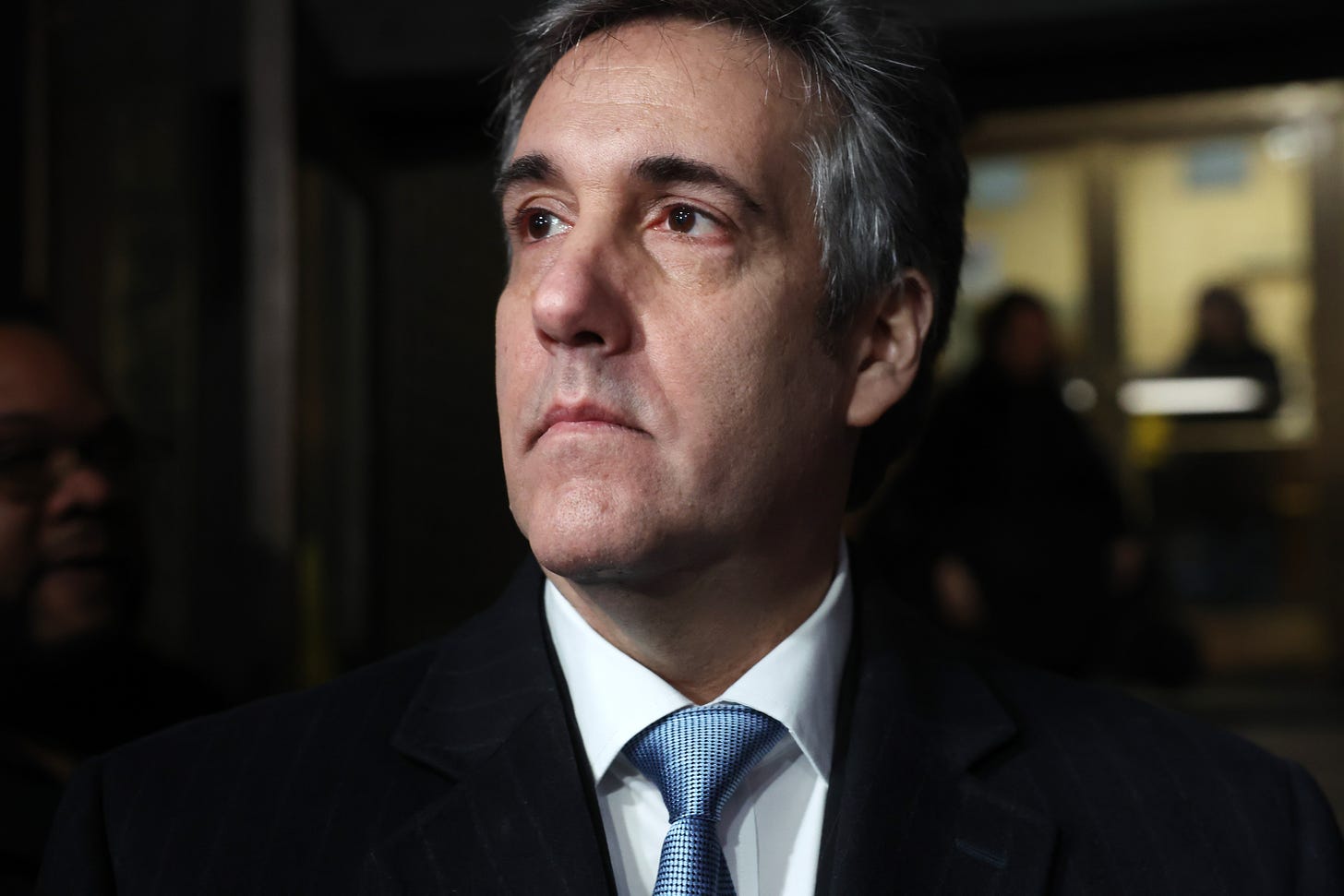Did Michael Cohen’s Testimony Cement the Case Against Trump?
Here’s what it takes to prove a case of felonious falsification of business records.

NOW THAT MICHAEL COHEN has finished his direct examination as a prosecution witness in former President Donald Trump’s hush money trial in Manhattan, and the prosecutors have announced that they have no further witnesses, the question arises as to whether they have proved their case beyond a reasonable doubt.
Most of the relevant facts were clearly established prior to Cohen taking the stand:
There is no question that Cohen arranged to pay Stormy Daniels $130,000 shortly before the 2016 presidential election to silence her story about a sexual encounter with Donald Trump at a golf event in 2006.
There is ample evidence, much of it in indisputable documentary form, that Cohen fronted the money for the payments through a sham business account, and that Trump eventually reimbursed him through a series of monthly payments.
Handwritten notes by Trump Organization CFO Allen Weisselberg, in addition to other documentary evidence, establish beyond doubt that the payments were falsely recorded not as reimbursements but as payments for nonexistent legal services performed pursuant to a nonexistent retainer agreement.
Testimony by former National Enquirer publisher David Pecker and other witnesses, including some still strongly loyal to Trump, established that the guiding if not exclusive intention of the hush money payments was to benefit Trump’s presidential campaign (and not, as Trump’s defense has averred, to save Melania Trump from the vapors).
And there is more than ample evidence that Trump not only knew exactly what the payments were for, but personally signed the reimbursement checks that were provided to Cohen in 2017.
All that was left for Cohen was to provide the final nail in the coffin, evidence proving beyond a reasonable doubt that Trump personally and directly participated in the falsification of the Trump Organization’s business records. That, after all, is the only crime charged against him.
Trump is charged with falsifying business records in the first degree under New York Penal Law Section 175.10. In order to obtain a conviction for first-degree falsification of business records, a felony, prosecutors must first prove that Trump committed the crime of falsifying business records in the second degree under New York Penal Law Section 175.05, a misdemeanor. Then, once a second-degree violation is established, it can be bumped up to the first degree by showing that the falsification was committed with an intent to commit (or conceal the commission of) another crime.
A person is guilty of falsifying business records in the second degree only if he or she “makes or causes” a false entry in the business records of an enterprise with an intent to defraud. That means that Trump can only be convicted in this case if the prosecution can prove that he personally made or caused to be made a false entry.
That means, in turn, that the key issue on which the entire case will most likely succeed or fail is the degree of Trump’s personal and direct involvement in the falsification of the Trump Organization’s business records. Not whether he had a one-night stand with Stormy Daniels. Not whether he paid Daniels hush money to cover it up. And not whether the Trump Organization—or agents acting on its behalf such as Weisselberg or corporate controller Jeffrey McConney—falsified the records of the payments.
What the prosecutors have to prove is that Trump himself made or caused the false entries to be made.
Prior to Cohen’s testimony, there was only circumstantial evidence of Trump’s personal involvement in the falsification of records. Nobody had testified to Trump making any entries in the Trump Organization’s business records, much less false entries about the hush money payments to Daniels. And nobody had testified to witnessing Trump instructing anybody else in the organization to do so. There was plenty of evidence implicating Trump directly in making the hush money payments, and plenty of evidence that Weisselberg had concocted a scheme to disguise the hush money payments to look like payment for legal services.
Given how Trump operated his business, especially when it came to shelling out money, it appears far-fetched that any of this took place without his approval. But reaching that conclusion required connecting dots of logic, which isn’t the same thing as direct evidence.
There were, however, two people in the room with Trump when disguising the hush money payments as payments for legal services was discussed, Michael Cohen and Allen Weisselberg. Only those two were in a position to give the kind of direct, firsthand testimony that would be the final nail in the coffin: that Trump personally made or caused to be made the false entries in the Trump Organization’s records. Since Weisselberg is in jail and won’t be testifying, that left everything down to Cohen.
MY READING OF THE TRANSCRIPT of Cohen’s testimony is that, credibility issues aside, he provided the testimony that closed the loop—but just barely.
Cohen testified that after a meeting with Weisselberg in which they agreed on a plan to falsely treat the reimbursements as payments for legal services, he and Weisselberg met with Trump at Trump Tower. Weisselberg told Cohen in Trump’s presence that “we’re going to pay you over 12 months.” Weisselberg said the payments would be made “like a legal service rendered.” Cohen testified that the payments were “designed to be” payment for future legal services but were actually “reimbursement of my money” paid to Daniels.
But Cohen didn’t quite make it clear that that was actually said in so many words during the meeting with Trump. Weisselberg showed Trump handwritten notes that roughly sketched out how the $130,000 reimbursement to Daniels would be doubled, “grossed up” because treating the payment as a legal expense rather than a reimbursement would require Cohen to pay taxes on it. Trump, Cohen says, “approved it.”
I say that this testimony only “barely” closed the loop on Trump’s personal involvement in the false business entries because I was struck by the seeming hesitancy of the prosecutors to go in for the kill shot. They got Cohen to testify in very general terms about what took place during the Trump Tower meeting, but they never dug deeply to probe Cohen for the kind of specifics that would have wrapped it into a neat package: Did you and Weisselberg specifically discuss with Trump that the reimbursements were going to be falsely recorded in the company’s records as legal expenses? Is that what Trump approved? Did you discuss why the payments had to be grossed up? Was there any discussion of a retainer agreement for legal services?
There are any number of ways the prosecutors might have phrased questions calculated to elicit the kind of devastating, unambiguous testimony that would have laid waste to Trump’s defense, but they didn’t go there. There’s still a remote possibility of additional testimony from Cohen providing more detail about the Trump Tower meeting. Although his direct examination is finished, Cohen is still on the witness stand. If, on cross-examination, Trump’s attorneys reopen testimony about the meeting, they could blunder into eliciting more harmful testimony, or they could open the door for the prosecution to do so on redirect. But absent that, this looks like a missed opportunity for the prosecution.
Why this cautious approach? Maybe there are good reasons. Maybe the prosecutors weren’t confident in the answers Cohen would give, but that seems unlikely. Maybe they worried that they might be perceived as leading Cohen to the answers they wanted. Maybe they thought they already had enough.
But whatever the reason, I can’t escape the uneasy feeling that they missed an opportunity to seal the deal with the jury, especially since the jurors apparently won’t be told why the only other witness who was in the room at the critical time, Allen Weisselberg, won’t be testifying at the trial.
If the jurors buy Cohen’s testimony, there’s more than enough evidence to support a conviction, but perhaps not enough to confidently predict one. Expect Trump’s attorneys to harp on the absence of a smoking gun in their closing argument, and to fault the prosecution for never having called the only witness who could theoretically corroborate Cohen’s testimony.
Expect Trump’s attorneys to leave the jurors with a simple, provocative question: “Where’s Weisselberg?”





